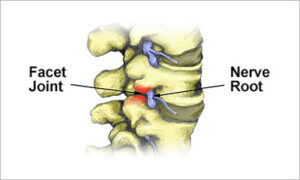Facet and Sacroiliac Joint (SI) Rhizotomy
 Rhizotomy is the same as a denervation or neurotomy procedure and is used to treat painful facet joints and sacroiliac joints. Facet and sacroiliac joint conditions can be very painful.
Rhizotomy is the same as a denervation or neurotomy procedure and is used to treat painful facet joints and sacroiliac joints. Facet and sacroiliac joint conditions can be very painful.
If the pain does not subside with chiropractic care, physical therapy, medication, and other non-invasive treatments, injections may be considered. Depending on the response to these injections, a Rhizotomy may be considered.
A Rhizotomy involves placing a cautery probe into the joint, then heating the tip of the probe. This procedure cauterizes the tiny nerve fibers in the joint. Relief from pain may not be permanent, but generally, last much longer than injections.
What to Expect
Once you have decided to have the Sacroiliac Joint or Facet rhizotomy:
- You may be asked to have a medical exam.
- You may be scheduled for a chest X-ray, EKG, and blood work.
- You may be asked to have a neurological or psychological examination.
- If you take aspirin or anti-inflammatory medications daily, stop taking them at least one week before the rhizotomy.
- If you take prescription medications or other medications, ask your doctor how soon before your rhizotomy surgery you should stop taking them.
- You will check into the hospital the morning of your rhizotomy. Do not eat or drink anything after midnight prior to your surgery.
- If you are on routine medications for heart or blood pressure, you can take your medication, as usual, the morning of your surgery with a sip of water.
The entire procedure usually takes 30 to 60 minutes:
- You will be placed on your side or on your stomach and supported with pillows to make you comfortable.
- The skin in the area to be treated will be cleaned.
- A local anesthetic will be used to numb the area.
- Fluoroscopy, a method used to make images, will be used as the physician passes the needle into the facet joint (or sacroiliac joint).
- A temperature-monitored electrode will be moved into the area of the joint.
- The activated electrode deadens sensory nerves.
You will be in a recovery room for about 30 minutes:
- It is important that you have someone drive you home.
- Activity should be restricted for approximately two weeks. During that time, there may be some pain from muscle spasms.

